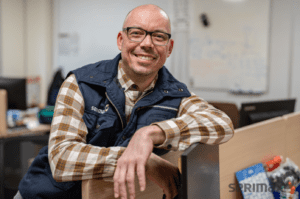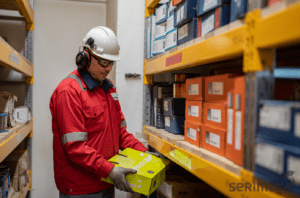Welding Consumables
We interviewed Laurent Baudouin, R&D Welding Engineering Manager TIS and welding consumable specialist in order to find out more about his job within Serimax. Laurent works in Olivier Revel’s team and oversees kilometers of welding wire at Serimax and we want to find out what this job really entails and which skills you need to manage such a position.

So, Laurent, what is your background?
I have been working in the welding industry for over 20 years, starting with the welding consumable suppliers for 6 years, where I learnt the basis of welding consumable production, and how to choose the appropriate welding consumables depending on the application. Then I worked for over 16 years within Serimax starting as a welding engineer in pipeline environment and then I went on to manage a team of welding engineers in its R&D welding center.
And why does Serimax need expertise in welding consumables?
In the pipeline industry the quality guarantee, repeatability as well as the productivity are a must. To achieve these pillars, the need of a quality insurance from one batch to another of welding consumables is critical to ensure the weld soundness, that’s where a welding purchase specification is essential.
Having knowledge of how welding consumables are produced, what the golden rules in quality insurance are and knowing the capability of the consumable is necessary to increase the reliability and consistency of the produce you buy. Understanding the difference between batch certificate, specific batch testing and DNV batch testing is critical to be able to choose the correct welding consumable for any project.
Today, everything is centered around reducing waste materials, can you reduce waste materials in this industry and specifically in the consumable market?
By using narrow gap and mechanized welding, Serimax is able to reduce waste materials. In comparison to manual welding where you weld on a V-preparation, the J preparation reduces the total quantity of welding consumables per weld, which in-turn increases the production as we are carrying one pass over the other, instead of several passes per layer as with manual welding.
MACRO SERIMAX!!


With all your experience, can you tell us what the most important thing to take into perspective is when choosing welding consumables?
To choose the appropriate welding consumable you need to consider:
- the material to be welded,
- the mechanical properties of the weld,
- the quality insurance of the welding consumable supplier,
- the track record (risk analysis)
- the energy that will be used during welding
- welding environment and position